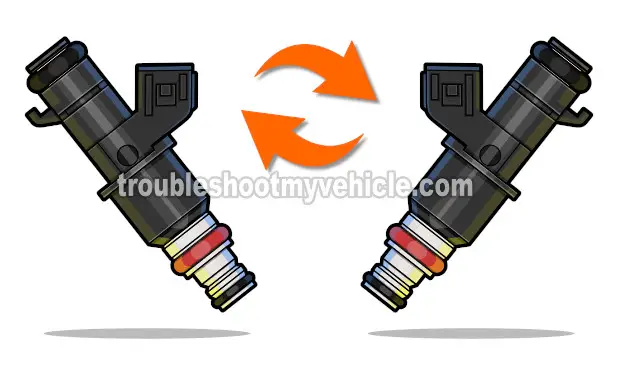TEST 2: Swapping Fuel Injectors

Every now and then, you run into a situation where you have tested all four injectors and they passed the resistance test, tested each COP ignition coil and they are all sparking, checked and verified the spark plugs are they too are OK, and checked and confirmed that all 4 cylinders' compression values are normal. What else can you do?
Well, I'm gonna' suggest that you swap the fuel injector that belongs to the 'cylinder' with the one right next to it and see if the miss follows the injector.
If the miss follows the injector, then you can replace it knowing you've 'hit the nail on the head'.
Do I Need To Test All Of Fuel Injectors?
In the fuel injector resistance test in the previous page, I asked you to measure all 4 fuel injectors' resistances and you may be wondering if this is really necessary especially if you only have one 'dead' cylinder that's causing the miss.
Well here are the reasons why:
- The fuel injectors are easy to get to.
- In this tutorial I don't provide you with a resistance specification of the fuel injector (which isn't necessary when you're testing all 4 and comparing their values).
- By testing all you're making sure the diagnostics trouble code isn't lying to you about which one it says is bad (diagnostic trouble codes, after all, are not infallible).
- I've been using this test with a lot of success, since the first multi-port fuel-injected vehicles where introduced and started giving the world diagnostic headaches (yes, I'm old).
Well, hopefully this info helped but what if you did test the fuel injectors and found that all have similar resistance specs. What next? Let's jump into the next subheading and I'll share some specific troubleshooting tips that will help.
My Easy Engine Misfire Diagnostic Strategy
There's a good chance that you've already done a few tests and/or replaced a few parts and your Honda still keeps missing (idling rough). I've been there before so in this section I want to share with you some of the experience and knowledge I've gained over the past 20 years working as an automotive diagnostic tech and tailored specifically to the Do-It-Yoursef'er like you.
The best news of all, is that there IS a logical step-by-step way of finding out if the fuel injector (or anything else) is the one causing your engine to miss (misfire, idle rough).
These are the steps I take:
- Check for misfire codes.
- Unfortunately, the PCM doesn't always set a specific bad fuel injector code, but when a fuel injector does go bad, you WILL see a Misfire Code.
- The next step is to check for spark and thus eliminate the ignition system as the source of the problem.
- I want to emphasize this to you: It's very important to eliminate the ignition system from the get-go.
- What I'm looking for here is to confirm that the spark plug is getting spark and I do this with a dedicated spark tester (like an HEI spark tester).
- This article will help you to get to the bottom of any ignition system problem: How To Test The Ignition Coils (2003-2006 2.4L Honda Accord).
- Next, I remove the spark plugs and visually inspect them.
- What I'm checking for are for cracks and/or carbon tracks and/or engine oil filling up the spark plug well.
- Honda 2.4L engines have a bad habit of leaking engine oil onto the spark plugs and COP coil boot (from the valve cover) and this is a common cause of an engine miss (misfire, rough idle).
- If everything above checks out OK, I then do an engine compression.
- This is a fast and easy test but is so often overlooked.
- What I'm looking for is to see if any one cylinder is too worn out. If it's too worn out it will always have 15% lower compression that the highest compression reading of the four.
- Check fuel injector resistance.
The purpose of all of the my tests (above) are to eliminate the ignition system and engine mechanical condition first, before attempting to blame or suspect a bad fuel injector.
And I can tell you that this diagnostic strategy has saved me from replacing some good fuel injectors and being able to nail down the ones that are bad.

If this info saved the day, buy me a beer!

